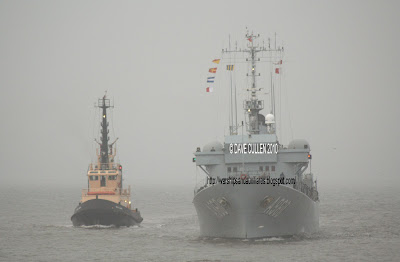Todays arrival was the Norwegian submarine ULA. She arrived 90 minuites early and came as quite a surprise when I got there!
The Ula class is a Norwegian submarine type which was assembled in Germany in the late 1980s and early 1990s. The class, consisting of 6 vessels, is currently the only submarine type in service with the Royal Norwegian Navy.
The ordering of a new Norwegian submersible design stemmed from a 1972 decision to modernize the Royal Norwegian Navy (RNoN) submarine flotilla, which then consisted of the aging Kobben class submarines.
The construction of the vessels was an international project. The combat systems were made in Norway by Kongsberg, the attack sonar is German and the flank sonars French. The hull sections were produced in Norway, and then assembled in Germany by Thyssen Nordseewerke, Emden. In Germany, the design is known as the U-Boot-Klasse 210.
When commissioned Ulas were the first Norwegian submarines with bedding for the entire crew and a shower.
The Ula class submarines are among the most silent and maneuverable submarines in the world. This, in combination with the relatively small size, makes them difficult to detect from surface vessels and ideal for operations in coastal areas. The Ula class submarines are regarded as both the most effective and cost-effective weapons in the RNoN.
Missions
In recent years, several submarines of the Ula class have been deployed in the Mediterranean Sea in support of the NATO Operation Active Endeavour, where their intelligence gathering ability have surpassed expectations. Their operational availability proved to be the highest of all the ships taking part in the operation. However, this deployment has highlighted the need to make the Ula class submarines better able to keep temperatures from getting too high for the crew when operating in warm waters. As a response to this, the KNM Ula have now been "tropicalized" by installing new cooling systems, and two more of the class are due for "tropicalization".
Future plans
During the period 2006-2008, the Ula class were modernised. Most notably, the submarines got new communication equipment, new electronic warfare support measures and a periscope upgrade. In May 2008, the contract for new sonars was signed. The first submarine will have new sonar in 2011, and the last in 2015. The Ula class will probably be kept in service until 2020.
Vessels
Six submarines were delivered (1989-1992) to the RNoN. All of them have their home base at Haakonsvern in Bergen. The boats are all named after places in Norway, with the exception of the S305, Uredd, which literally translates to "unafraid" or "unfearing." The ship prefix for Norwegian vessels is KNM (Kongelig Norsk Marine, Royal Norwegian Navy) in Norwegian.
| Name | Pen No | Commissioned |
| ULA | S300 | 1989 |
| UTSIRA | S301 | 1992 |
| UTSTEIN | S302 | 1991 |
| UTVÆR | S303 | 1990 |
| UTHAUG | S304 | 1991 |
| UREDD | S305 | 1990 |
She is seen here approaching Leith in high winds, the escorting tug is Seal Carr
A close up up of the conning tower
Almost in the lock
Finally in the lock































